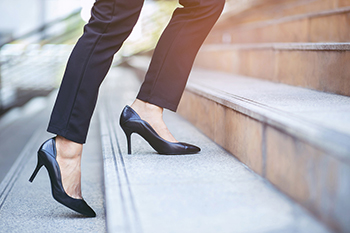
High heels, while undoubtedly stylish, come with a hidden price tag that affects our feet, which are the foundation of our body. These chic yet often uncomfortable footwear choices can lead to a cascade of issues. The elevated heel forces the body's weight forward, disrupting the natural alignment of the spine, possibly causing lower back pain. Additionally, toes are crammed into tight spaces, and may lead to deformities such as bunions and hammertoes. The lack of proper arch support strains the feet's ligaments and tendons, contributing to plantar fasciitis and Achilles tendonitis. Prolonged wear can result in shortened calf muscles, impacting overall gait and stability. Recognizing how wearing high heels can negatively affect the feet may cause an individual to try different footwear. If you would like more information about the effects high heels can have on the feet, it is suggested that you speak with a podiatrist who can address any questions or concerns you may have.
High heels have a history of causing foot and ankle problems. If you have any concerns about your feet or ankles, contact Shawn Echard, DPM from Laurel Podiatry LLC. Our practitioner can provide the care you need to keep you pain-free and on your feet.
Effects of High Heels on the Feet
High heels are popular shoes among women because of their many styles and societal appeal. Despite this, high heels can still cause many health problems if worn too frequently.
Which Parts of My Body Will Be Affected by High Heels?
- Ankle Joints
- Achilles Tendon – May shorten and stiffen with prolonged wear
- Balls of the Feet
- Knees – Heels cause the knees to bend constantly, creating stress on them
- Back – They decrease the spine’s ability to absorb shock, which may lead to back pain. The vertebrae of the lower back may compress.
What Kinds of Foot Problems Can Develop from Wearing High Heels?
- Corns
- Calluses
- Hammertoe
- Bunions
- Morton’s Neuroma
- Plantar Fasciitis
How Can I Still Wear High Heels and Maintain Foot Health?
If you want to wear high heeled shoes, make sure that you are not wearing them every day, as this will help prevent long term physical problems. Try wearing thicker heels as opposed to stilettos to distribute weight more evenly across the feet. Always make sure you are wearing the proper shoes for the right occasion, such as sneakers for exercising. If you walk to work, try carrying your heels with you and changing into them once you arrive at work. Adding inserts to your heels can help cushion your feet and absorb shock. Full foot inserts or metatarsal pads are available.
If you have any questions please feel free to contact our offices located in Greensburg and Somerset, PA . We offer the newest diagnostic and treatment technologies for all your foot and ankle needs.
